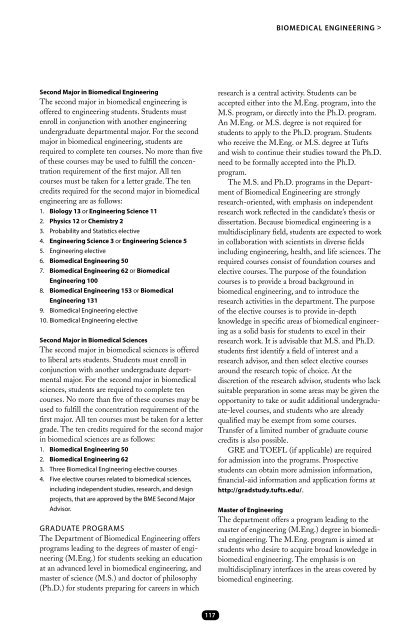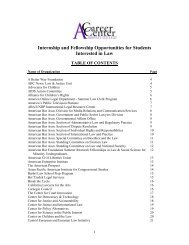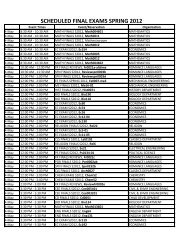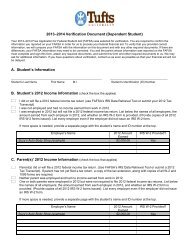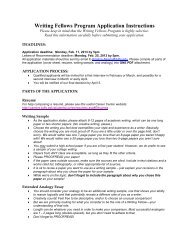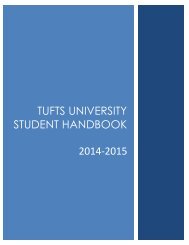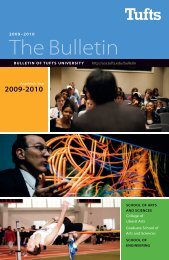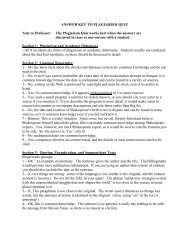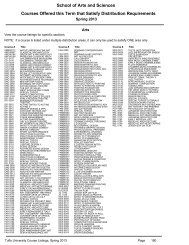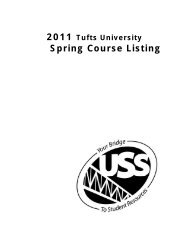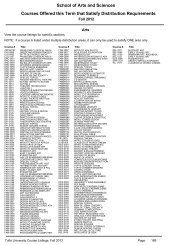2013â2014 The Bulletin - USS at Tufts - Tufts University
2013â2014 The Bulletin - USS at Tufts - Tufts University
2013â2014 The Bulletin - USS at Tufts - Tufts University
Create successful ePaper yourself
Turn your PDF publications into a flip-book with our unique Google optimized e-Paper software.
Biomedical Engineering ><br />
Second Major in Biomedical Engineering<br />
<strong>The</strong> second major in biomedical engineering is<br />
offered to engineering students. Students must<br />
enroll in conjunction with another engineering<br />
undergradu<strong>at</strong>e departmental major. For the second<br />
major in biomedical engineering, students are<br />
required to complete ten courses. No more than five<br />
of these courses may be used to fulfill the concentr<strong>at</strong>ion<br />
requirement of the first major. All ten<br />
courses must be taken for a letter grade. <strong>The</strong> ten<br />
credits required for the second major in biomedical<br />
engineering are as follows:<br />
1. Biology 13 or Engineering Science 11<br />
2. Physics 12 or Chemistry 2<br />
3. Probability and St<strong>at</strong>istics elective<br />
4. Engineering Science 3 or Engineering Science 5<br />
5. Engineering elective<br />
6. Biomedical Engineering 50<br />
7. Biomedical Engineering 62 or Biomedical<br />
Engineering 100<br />
8. Biomedical Engineering 153 or Biomedical<br />
Engineering 131<br />
9. Biomedical Engineering elective<br />
10. Biomedical Engineering elective<br />
Second Major in Biomedical Sciences<br />
<strong>The</strong> second major in biomedical sciences is offered<br />
to liberal arts students. Students must enroll in<br />
conjunction with another undergradu<strong>at</strong>e departmental<br />
major. For the second major in biomedical<br />
sciences, students are required to complete ten<br />
courses. No more than five of these courses may be<br />
used to fulfill the concentr<strong>at</strong>ion requirement of the<br />
first major. All ten courses must be taken for a letter<br />
grade. <strong>The</strong> ten credits required for the second major<br />
in biomedical sciences are as follows:<br />
1. Biomedical Engineering 50<br />
2. Biomedical Engineering 62<br />
3. Three Biomedical Engineering elective courses<br />
4. five elective courses rel<strong>at</strong>ed to biomedical sciences,<br />
including independent studies, research, and design<br />
projects, th<strong>at</strong> are approved by the BME Second Major<br />
Advisor.<br />
GRADUATE ProgrAMS<br />
<strong>The</strong> Department of Biomedical Engineering offers<br />
programs leading to the degrees of master of engineering<br />
(M.Eng.) for students seeking an educ<strong>at</strong>ion<br />
<strong>at</strong> an advanced level in biomedical engineering, and<br />
master of science (M.S.) and doctor of philosophy<br />
(Ph.D.) for students preparing for careers in which<br />
research is a central activity. Students can be<br />
accepted either into the M.Eng. program, into the<br />
M.S. program, or directly into the Ph.D. program.<br />
An M.Eng. or M.S. degree is not required for<br />
students to apply to the Ph.D. program. Students<br />
who receive the M.Eng. or M.S. degree <strong>at</strong> <strong>Tufts</strong><br />
and wish to continue their studies toward the Ph.D.<br />
need to be formally accepted into the Ph.D.<br />
program.<br />
<strong>The</strong> M.S. and Ph.D. programs in the Department<br />
of Biomedical Engineering are strongly<br />
research-oriented, with emphasis on independent<br />
research work reflected in the candid<strong>at</strong>e’s thesis or<br />
dissert<strong>at</strong>ion. Because biomedical engineering is a<br />
multidisciplinary field, students are expected to work<br />
in collabor<strong>at</strong>ion with scientists in diverse fields<br />
including engineering, health, and life sciences. <strong>The</strong><br />
required courses consist of found<strong>at</strong>ion courses and<br />
elective courses. <strong>The</strong> purpose of the found<strong>at</strong>ion<br />
courses is to provide a broad background in<br />
biomedical engineering, and to introduce the<br />
research activities in the department. <strong>The</strong> purpose<br />
of the elective courses is to provide in-depth<br />
knowledge in specific areas of biomedical engineering<br />
as a solid basis for students to excel in their<br />
research work. It is advisable th<strong>at</strong> M.S. and Ph.D.<br />
students first identify a field of interest and a<br />
research advisor, and then select elective courses<br />
around the research topic of choice. At the<br />
discretion of the research advisor, students who lack<br />
suitable prepar<strong>at</strong>ion in some areas may be given the<br />
opportunity to take or audit additional undergradu<strong>at</strong>e-level<br />
courses, and students who are already<br />
qualified may be exempt from some courses.<br />
Transfer of a limited number of gradu<strong>at</strong>e course<br />
credits is also possible.<br />
GRE and TOEFL (if applicable) are required<br />
for admission into the programs. Prospective<br />
students can obtain more admission inform<strong>at</strong>ion,<br />
financial-aid inform<strong>at</strong>ion and applic<strong>at</strong>ion forms <strong>at</strong><br />
http://gradstudy.tufts.edu/.<br />
Master of Engineering<br />
<strong>The</strong> department offers a program leading to the<br />
master of engineering (M.Eng.) degree in biomedical<br />
engineering. <strong>The</strong> M.Eng. program is aimed <strong>at</strong><br />
students who desire to acquire broad knowledge in<br />
biomedical engineering. <strong>The</strong> emphasis is on<br />
multidisciplinary interfaces in the areas covered by<br />
biomedical engineering.<br />
117


